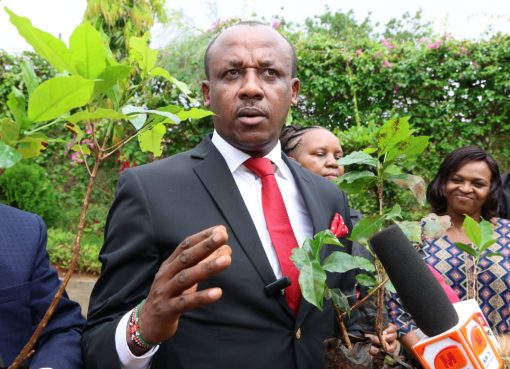The County Government of Nakuru is seeking partnerships towards incorporating Artificial Intelligence (AI) and other emerging technologies in operations of its hospitals and dispensaries to help identify health trends, anticipate disease outbreaks and optimize resource allocation.
While noting that the future of health care is data-driven, bolstered by analytics and fueled by artificial intelligence (AI) and machine learning (ML), Deputy Governor Mr David Kones stated that by leveraging machine learning algorithms, AI systems can swiftly identify patterns and predict diseases, assisting healthcare professionals in making accurate diagnoses and recommending personalized treatment plans.
Mr Kones indicated that due to scarcity of healthcare professionals in some parts of the devolved unit, AI-enabled technologies can fill the gaps. For instance, he added chatbots and virtual assistants that can take preliminary medical advice and information to patients, reducing the burden on overstretched healthcare facilities.
“Further, remote patient monitoring devices equipped with AI capabilities can track vital signs, detect abnormalities, and promptly alert healthcare providers, ensuring timely interventions and better patient outcomes. Newer AI such as voice-to-text and generative AI tools for summarizing patient data have also proven useful for health workers in the field,” he stated.
Speaking at the County Headquarters during a consultative meeting with Dr Luqman Lawal from Mayo Clinic and the Managing Director, Standard Medical Group (STANMED) Mr Ian Okello, the Deputy Governor observed that adoption of AI and other evolving technologies in healthcare access is ushering in a new era of innovation, efficiency, and accessibility, revolutionizing healthcare services for the people of Africa and beyond.
“In Kenya, the integration of AI signifies not just technological advancement but a transformative leap forward. With its ranking as Africa’s fifth most AI-ready nation, as per Oxford Insights’ 2022 report, Kenya is poised to leverage AI in reshaping its public services and beyond. The effective utilization of AI in healthcare is intrinsically linked to the vast amounts of data being generated every day,” he explained.
According to the Deputy Governor, by harnessing big data and analytics, healthcare providers can gain valuable insights into disease patterns, epidemiology, and treatment effectiveness, allowing for evidence-based decision-making.
AI is the simulation of human processes by machines, especially computers, through the use of captured data. The objective of AI is to make computer systems simulate human thinking in solving complex problems.
In healthcare, AI has been credited for improving clinical workflows while simultaneously contributing relief and prevention of burnout. It can also help pinpoint the number of hospital-acquired infections to pati ents.
In the health care sector AI can be deployed for diagnosis and clinical care, such as responding to patients’ written queries, Patient-guided use, such as for investigating symptoms and treatment and clerical and administrative tasks, such as documenting and summarizing patient visits within electronic health records.
The technology is also used for medical and nursing education, including providing trainees with simulated patient encounters and scientific research and drug development, including identifying new compounds.
Mr Kones who was flanked by Chief Officer in charge of Medical Services Dr John Murima and County Director for Medical Services, Dr Daniel Wainaina observed that with its ability to analyze vast amounts of medical data and generate valuable insights, AI is revolutionizing diagnostics, treatment, and healthcare management, including analyzing X-rays, ultrasounds and Magnetic resonance imaging (MRI).
The Deputy Governor further disclosed that through the partnership with Mayo Clinic and Standard Medical Group (STANMED) County Health care facilities will benefit with expertise in latest digital technology tools that will enhance the quality and efficiency of the health care services provision.
“The implementation of these technologies is also expected to streamline operations, thereby reducing the financial burden to the patients and easing the workload of the healthcare professionals. Further, the partnership will explore setting up an exchange program that will offer physicians the opportunity to be trained on the latest medical technologies,” stated Mr Kones.
Dr Lawal indicated that while the integration of AI and emerging technologies in healthcare brings forth numerous benefits, it was crucial to address ethical considerations and overcome challenges. He affirmed that privacy and data security must be prioritized to ensure the confidentiality of patients’ sensitive information.
“Robust regulatory frameworks and stringent data protection measures should be in place to safeguard patient privacy and prevent misuse of data. Furthermore, it is imperative to bridge the digital divide and ensure equitable access to these technologies. Investments should be made in infrastructure development and digital literacy programs to enable widespread adoption and prevent the aggravation of existing healthcare disparities,” stated Dr Lawal.
The integration of these technologies, he observed, also has the potential to expand access to under served populations, and ultimately, save lives.
The Mayo Clinic representative noted every medical facility has tons of records, which, if digitized, will help machines to make accurate assessment of disease patterns.
“Diagnostic areas such as a medical laboratory would perhaps experience the greatest transformation of AI and improve the quality of care. Greater impact will be felt if we understand the disruptiveness of AI and work towards encouraging responsible data sharing to boost data availability for training AI systems,” he stated.
Mr Okello observed that the World Health Organization (WHO) is releasing new guidance on the ethics and governance of large multi-modal models (LMMs) – a type of fast growing generative artificial intelligence (AI) technology with applications across health care.
The guidance, explained Mr Okello, outlines over 40 recommendations for consideration by governments, technology companies, and health care providers to ensure the appropriate use of LMMs to promote and protect the health of populations.
LMMs can accept one or more types of data inputs, such as text, videos, and images, and generate diverse outputs not limited to the type of data inputted. LMMs are unique in their mimicry of human communication and ability to carry out tasks they were not explicitly programmed to perform.
LMMs have been adopted faster than any consumer application in history, with several platforms – such as ChatGPT, Bard and Bert – entering the public consciousness in 2023.
“Generative AI technologies have the potential to improve health care but only if those who develop, regulate, and use these technologies identify and fully account for the associated risks,” said Dr Jeremy Farrar, WHO Chief Scientist. “We need transparent information and policies to manage the design, development, and use of LMMs to achieve better health outcomes and overcome persisting health inequities.”
By Jane Ngugi and Jedidah Gitau





